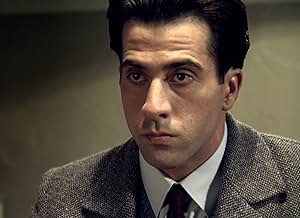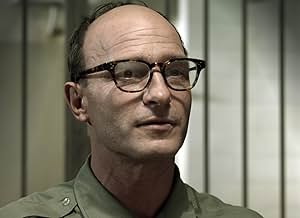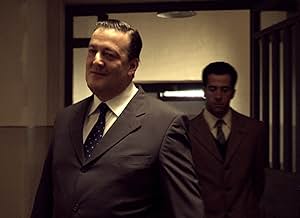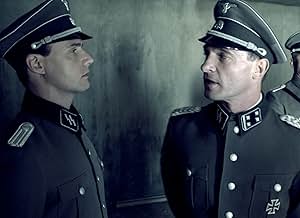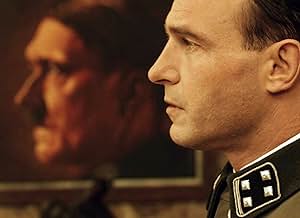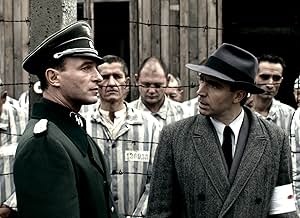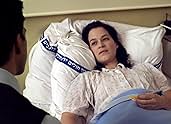Adicionar um enredo no seu idiomaBased upon the final confession of Adolf Eichmann, made before his execution in Israel as he accounts to Captain Avner Less, a young Israeli police officer, of his past as the architect of H... Ler tudoBased upon the final confession of Adolf Eichmann, made before his execution in Israel as he accounts to Captain Avner Less, a young Israeli police officer, of his past as the architect of Hitler's plan for the Final Solution. Captured by intelligence operatives in Argentina, 15 ... Ler tudoBased upon the final confession of Adolf Eichmann, made before his execution in Israel as he accounts to Captain Avner Less, a young Israeli police officer, of his past as the architect of Hitler's plan for the Final Solution. Captured by intelligence operatives in Argentina, 15 years after World War II, Eichmann (Kretschmann), the world's most wanted man, must be bro... Ler tudo
- Self
- (cenas de arquivo)
- (narração)
- Baroness Ingrid von Ihama
- (as Tereza Srbová)
- Hannah
- (as Tilly Golding)
Avaliações em destaque
Yes, the film suffers from some weird accents. Thomas Kretschmann, as Eichmann himself, speaks in a clipped German accent; Troy Garity, Franka Potente and Stephen Fry (in a bizarre but oddly convincing performance as, of all things, the Israeli Minister of Justice) all have indeterminately foreign accents, and none of it really makes sense.
Having said that, Kretschmann carries off the job he has been asked to do, and Garity is really very good as Avner Less, who was not Eichmann's prosecutor (as someone else stated) but his interrogator. Less was not a lawyer but a police officer. The subplot of his wife being chronically ill is presumably there because it was true; it would have been better if they'd left it out, because what drama there is in this film is the battle of wills between Less the dogged interrogator and Eichmann the stolidly evasive interrogatee.
I note in passing that Stephen Fry might almost be the rather more well-fed first cousin, or perhaps uncle, of Ciaran Hinds in "Munich". The accent is the same, and the tallness, slicked-down hair and intimidating bulk is very similar.
If they'd toned down the lurid stuff about Eichmann's sex life and focused on what he actually did for a living, this could have been as good as "Conspiracy". Pity.
When I bought this title I was expecting a detailed examination of "the architect of Hitler's plan"; no matter the bias. All I received in return was a turgid family drama set against a few pointless conversations between the police captain Less and Eichmann. Once sensationalised by dubious episodes in the man's Nazi career all that remained were constant accusations and denials by Less and Eichmann. Admittedly this man may not have been exciting or even entertaining within the Nazi regime, but one thing he most certainly was, was life-changing.
There is an interested audience for films that seek to examine the minds of the "architects of Hitler's plan", as Oliver Hirschbiegel's "Downfall" has shown. Studying German history I was more concerned with the Socialists than the National Socialists, but the Nazi motivation and objectives are still a fascinating aspect of 20th Century History. "Eichmann" however does nothing to advance the understanding of the Nazis, nor the Eichmann that oiled the wheels of the Holocaust, and seems more like Jewish apologia for interrogating Eichmann by a man who suffered personal tragedy in the Holocaust, convicted him on mere supposition and rumour, and murdered him because of intense social and political pressure.
This is a historic drama with biographic elements dealing with Adolf Eichman and his interrogator officer Avner Less well performed by Thomas Kretschmann and Troy Garity, respectively. Furthermore, Stephen Fry as Jewish Minister and Franka Potente as affecting Avner's wife. The story is carried out by means of various flashbacks describing the cruel existence of Eichmannn. Atmospheric musical score by Richard Harvey and cold cinematography by Mike Connor. The motion picture is professionally by Robert Young.
Adding more remarks along with the widely narrated on the movie referred to Adolf Eichmann, his life is the following : Eichmann (1906-62) was born in Austria. After starting as a lowly file clerk , he learned that there was an opening in Heinrich Himmler's SD, the information center for the Gestapo . Himmler, who believed that Eichmann could speak Hebrew, made him head of the Scientific Museum Jewish Affairs. In 1937 Eichmann paid a short visit to Palestine to get in touch with Arab leaders , but the was ordered out of the country by the British. On his return to Germany he was rapidly promoted. After service in the Reich Central Office of Jewish Emigration he was made chief of Subsection IV-B-4 of the RSHA, the Reich Central Security Office, as an expert on Jewish affairs. He was present at the Wansee Conference on January 20 , 1942, when it was decided to deport Jews to the extermination camps. In August 1944 Eichmann reported to Himmler that, although the death camps kept no exact statistics , 4 million Jews had died in them and that 2 million more had been shot or killed by mobile units. Arrested at the end of WWII, Eichmann escaped unrecognized from an internment camp in the American zone in 1946 and disappeared. On May 11, 1969, the Israeli secret service found him in Argentina and smuggling him back to Israel . His trial , which took place in Jerusalem from April 11 to August 14, 1961, aroused worldwide attention. He was charged with crimes against humanity, and war crimes. Found guilty, he was hanged at Ramle on May 31,1962.
All of that is leading up to my strong suggestion that you skip the film and read Hannah Arendt's amazing book about the actual Eichmann trial in Jerusalem, Eichmann: A Report on the Banality of Evil. Here you will find a non-dramatic, non-titillating version of the story that neither exaggerates nor diminishes Eichmann's evil, but rather reveals him in a matter-of-fact way as an opportunist, a careerist who merely wanted to advance, climb the ladder, attain the next "title," etc. He apparently did not have any particular hatred toward Jews. None of this in my estimation makes him less evil; the book actually reveals the "banality" of his evil by taking away the specter of a crazed monster. His evil lies in its being sane and in a sense "ordinary." Therefore, given its serious subject matter, I feel the film only partially reflects the facts Arendt reveals so clearly, obscuring them with with sex and useless side stories. The performances are good, the film is well made, etc. That's not my point. If you want to make a formulaic film, a horror film, a sexy film, or any other kind of film, have at it. But don't use Eichmann as your subject matter. The subject matter is too serious to be misused in any way. Read the book, please.
Thomas Kretschmann's work here is superb, truly superb, particularly in light of the fact that the film interrupts this superb acting with cutaways to various scenes while the voice of Kretschmann as Eichmann is heard writing letters to his children. I don't CARE. Give me more of Kretschmann being interrogated. He is riveting.
Now, the bad stuff:
The 'artistic license' this film takes is shameful in that it is an insult to every single jew who was murdered by the Nazi regime. There is no good reason for the filmmakers to have given Eichmann a Viennese Jew for a mistress. The notes of Eichmann's interrogator, Avner Less, do not mention anything about this, nor did it come up in Eichmann's Nuremberg trial-in-absentia or the Israeli trial. Nor was there a need to make Eichmann the lover of a Hungarian mistress who was so insatiable for the deaths of jews that she would reprimand him for not killing enough while they engaged in foreplay. This is obscene and it obscures the larger truth that seemingly inconsequential, everyday men can do terrible damage.
To take these liberties is an attempt to obscure the monster that Eichmann really was. To remove the inexplicable terror that is the result of banal men doing unspeakable things in the name of ideology and / or the protection of a larger group of criminals, is misguided at best and an insult to every Jewish man, woman and child who walked into those building thinking they were going to get a shower.
They should have stuck to the text of "The Eichmann Interrogation" and let the actors use their skills to produce the tension. That's what they are paid for, after all, and I would have liked to have seen more of the interaction between the two main characters.
I give it a '4' on the strength of Thomas Kretschmann's acting alone. Otherwise this movie is a terrible waste of time.
Você sabia?
- CuriosidadesAccording to a British reporter on location, fellow cast members Troy Garity and Thomas Kretschmann were so upset with script revisions of the baby-in-office scene that Kretschmann promptly threw them in the trash, explaining, 'I'll just file this here for safekeeping.' The revisions were later dropped.
- Erros de gravação(at around 1 min) In the scene where the minister leaves the room after telling Avner that his father had been sent to Auschwitz by Eichmann, a large contemporary map of Europe is visible on the wall. The maps contains the re-unified Germany, the successor states of the Soviet Union, the broken up former Yugoslavia, and the split Czech and Slovak Republics - which is the late 1990s status and not 1960/61.
- Citações
Avner Less: [after Eichmann's interrogation and trial] We showed him more justice than he ever showed us.
- Trilhas sonorasAlma Partida
Words and Music by Mauricio Vanegas
West One Music Ltd
Principais escolhas
- How long is Eichmann?Fornecido pela Alexa
Detalhes
- Data de lançamento
- Países de origem
- Central de atendimento oficial
- Idiomas
- Também conhecido como
- Eichmann
- Locações de filme
- Empresas de produção
- Consulte mais créditos da empresa na IMDbPro
Bilheteria
- Orçamento
- US$ 8.000.000 (estimativa)
- Faturamento bruto nos EUA e Canadá
- US$ 2.706
- Fim de semana de estreia nos EUA e Canadá
- US$ 573
- 31 de out. de 2010
- Faturamento bruto mundial
- US$ 2.706
- Tempo de duração
- 1 h 36 min(96 min)
- Cor
- Mixagem de som
- Proporção
- 1.85 : 1


